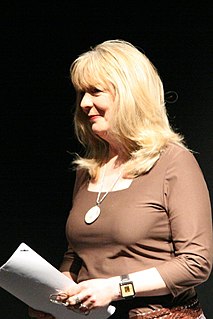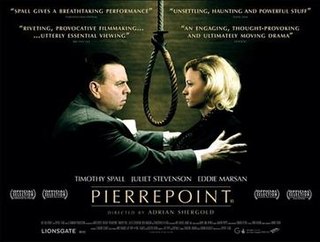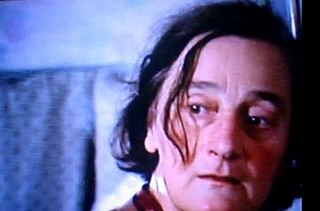Related Research Articles

Abigail's Party is a play for stage and television, devised and directed in 1977 by Mike Leigh. It is a suburban situation comedy of manners, and a satire on the aspirations and tastes of the new middle class that emerged in Britain in the 1970s. The play developed in lengthy improvisations during which Mike Leigh explored the characters with the actors, but did not always reveal the incidents that would occur during the play. The production opened in April 1977 at the Hampstead Theatre, and returned after its initial run in the summer of 1977, for 104 performances in all. A recording was arranged at the BBC as a Play for Today, produced by Margaret Matheson for BBC Scotland and transmitted in November 1977.

Mike Leigh is an English film and theatre director, screenwriter and playwright. He studied at the Royal Academy of Dramatic Art (RADA) and further at the Camberwell School of Art, the Central School of Art and Design and the London School of Film Technique. He began his career as a theatre director and playwright in the mid-1960s, before transitioning to making televised plays and films for BBC Television in the 1970s and '80s. Leigh is known for his lengthy rehearsal and improvisation techniques with actors to build characters and narrative for his films. His purpose is to capture reality and present "emotional, subjective, intuitive, instinctive, vulnerable films." His films and stage plays, according to critic Michael Coveney, "comprise a distinctive, homogenous body of work which stands comparison with anyone's in the British theatre and cinema over the same period."

Topsy-Turvy is a 1999 British musical period drama film written and directed by Mike Leigh, starring Allan Corduner as Sir Arthur Sullivan and Jim Broadbent as W.S. Gilbert, along with Timothy Spall, Lesley Manville and Ron Cook. The story concerns the 15-month period in 1884 and 1885 leading up to the premiere of Gilbert and Sullivan's The Mikado. The film focuses on the creative conflict between playwright and composer, and their decision to continue their partnership, which led to their creation of several more Savoy operas.

Life Is Sweet is a 1990 British comedy-drama film directed by Mike Leigh, starring Alison Steadman, Jim Broadbent, Claire Skinner, Jane Horrocks and Timothy Spall. Leigh's third cinematic film, it was his most commercially successful title at the time of release. A tragi-comic story, it follows the fortunes of a working-class North London family over a few weeks one summer.

Timothy Leonard Spall is an English actor and presenter. He became a household name in the UK after appearing as Barry Spencer Taylor in the 1983 ITV comedy-drama series Auf Wiedersehen, Pet.

Alison Steadman is an English actress. She received the 1991 National Society of Film Critics Award for Best Actress for the Mike Leigh film Life Is Sweet and the 1993 Olivier Award for Best Actress for her role as Mari in the original production of The Rise and Fall of Little Voice. In a 2007 Channel 4 poll, the ‘50 Greatest Actors’ voted for by other actors, she was ranked 42.

Pierrepoint is a 2005 British film directed by Adrian Shergold about the life of British executioner Albert Pierrepoint.

All or Nothing is a 2002 British drama film written and directed by Mike Leigh and starring Timothy Spall and Lesley Manville. Like much of Leigh's work, the film is set in present-day London, and depicts three working-class families and their everyday lives.
The National Board of Review Award for Best Acting by an Ensemble is an annual film award given by the National Board of Review.

Meantime is a 1983 British comedy-drama television film directed by Mike Leigh, produced by Central Television for Channel 4. It was shown in 1983 at the London Film Festival and on Channel 4 and at the 1984 Berlin International Film Festival. According to the critic Michael Coveney, "the sapping, debilitating and demeaning state of unemployment, the futile sense of waste, has not been more poignantly, or poetically, expressed in any other film of the period."
The 1970 British League season was the 36th season of the top tier of speedway in the United Kingdom and the sixth season known as the British League.
The 1971 British League season was the 37th season of the top tier of speedway in the United Kingdom and the seventh season known as the British League.

The Kiss of Death is a 1977 BBC Play for Today.
The 1981 British League season was the 47th season of the top tier of speedway in the United Kingdom and the 17th known as the British League.
Karina Fernandez is a British actress. She is best known for her performances in three of Mike Leigh's films – Another Year and Happy-Go-Lucky and Mr. Turner. Fernandez graduated from Drama Centre London. She is an instructor at City Academy, London.

Hard Labour is a 1973 television film, directed by Mike Leigh and produced by Tony Garnett which was broadcast as part of the BBC anthology series Play for Today. The film stars Liz Smith in her first major role. The film is the most clearly drawn in all Leigh's work from the background in Higher and Lower Broughton where he grew up. "Though elements of autobiography are buried in all Leigh's films and plays, only Hard Labour is set in Salford, – the scenes in the Stones' house were shot in a house just two doors along from where the Leighs had lived in Cavendish Road."
Grown-Ups is a 1980 British BBC television film devised and directed by Mike Leigh. It stars Lesley Manville, Philip Davis, Brenda Blethyn, Janine Duvitski, Lindsay Duncan and Sam Kelly. It was edited by Robin Sales and produced by Louis Marks for the BBC, and originally shown on BBC 2 on 28 November 1980.
Too Much of a Good Thing is a radio play, recorded entirely on location, as if it were a film, by Mike Leigh. Liane Aukin, the 'midwife' of the project, a BBC radio producer, knew Leigh through her brother David, the general manager at Hampstead Theatre. She had initially asked Leigh to revive Abigail's Party on the radio, but he preferred to supply an original piece. Ronald Mason, the head of radio drama, was enthusiastic and allocated £5000.

Mr. Turner is a 2014 biographical drama film based on the last 25 years of the life of artist J. M. W. Turner (1775–1851). Written and directed by Mike Leigh, the film stars Timothy Spall in the title role, with Dorothy Atkinson, Paul Jesson, Marion Bailey, Lesley Manville, and Martin Savage. It premiered in competition for the Palme d'Or at the 2014 Cannes Film Festival, where Spall won the award for Best Actor and Dick Pope received a special jury prize for the film's cinematography.

Finding Your Feet is a 2017 British romantic comedy film directed by Richard Loncraine and written by Nick Moorcroft and Meg Leonard. The film stars Imelda Staunton, Timothy Spall, Celia Imrie, Joanna Lumley and David Hayman, and was released on 23 February 2018 in the United Kingdom.